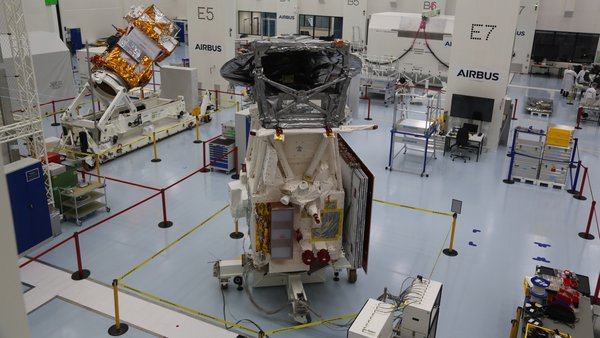EarthCARE: Tracking interactions in Earth's atmosphere
Leipzig, 01.02.2024
Germany plays a key role in the algorithm development & data interpretation of the mission.
Whether facing drought and heat in southern Europe or coping with heavy precipitation events in Germany, solar radiation is the decisive factor influencing climate events and weather dynamics on Earth, as it drives atmospheric circulation. However, this radiation is distributed very differently in the atmosphere, interacting with clouds, aerosols – comprising solid and liquid particles – and trace gases. To enhance the accuracy of predictions in the near future, a comprehensive global understanding of aerosol and cloud parameters, which are currently not easy to determine, is important. Deciphering their interactions within the atmosphere is crucial. This and the measurement of radiation density will allow the radiation budget of the planet to be determined much more precisely than is the case today. The European Space Agency (ESA) and the Japan Aerospace Exploration Agency (JAXA) are therefore planning to launch their largest and most complex Earth Explorer mission to date in May 2024. The German Space Agency at the German Aerospace Center (Deutsches Zentrum für Luft- und Raumfahrt; DLR) has a substantial role in the Earth Cloud Aerosol and Radiation Explorer (EarthCARE) mission – as part of ESA's FutureEO Earth observation programme, with Germany serving as the programme lead since its inception and contributing several hundred million euros to date. In addition, the German National Space Programme is allocating several million euros to facilitate the use of EarthCARE data by German researchers during the operational phase. A project office will be established to support work by German research institutions and universities, marking one of the most significant contributions to the validation process in Europe. It will be substantially supported by a flight campaign conducted using the German High Altitude and Long Range (HALO) research aircraft. This campaign will be coordinated by the DLR Institute of Atmospheric Physics and the Max Planck Institute for Meteorology.
TROPOS researchers are working on the development of the mission's algorithms and are supporting the validation campaign, for which the HALO (High Altitude and Long Range Research Aircraft) research aircraft will be equipped with four instruments comparable to those of EarthCARE. The measurement flights, coordinated by the Institute of Atmospheric Physics and the Max Planck Institute for Meteorology together with the Leipzig Institute for Meteorology and the Universities of Hamburg, Cologne and Munich, will begin from Cape Verde in August 2024. There, the validation will be supported by ground measurements conducted by the Leibniz Institute for Tropospheric Research (TROPOS). In September, HALO will continue on to Barbados, where the Max Planck Institute for Meteorology will accompany the measurement flights with ground measurements. HALO will then return to DLR in Oberpfaffenhofen, where extensive flights over Europe, the extratropical North Atlantic and over the Alps to the Mediterranean will be conducted during the autumn.
More about EarthCARE and the HALO flights in the DLR press release from 1 February 2024:
European-Japanese EarthCARE satellite handed over in Friedrichshafen
https://www.dlr.de/en/latest/news/2024/tracking-interactions-in-earth-s-atmosphere
EarthCARE - ESA's cloud and aerosol mission:
https://www.esa.int/Applications/Observing_the_Earth/FutureEO/EarthCARE

